英语语法-形容词
初中英语语法---形容词
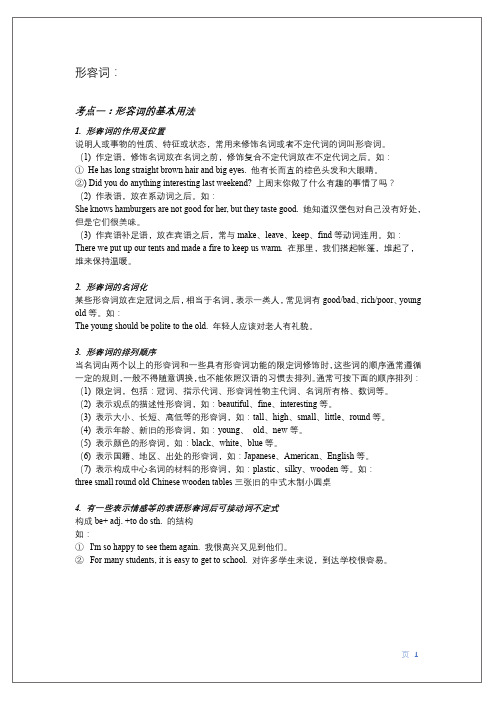
形容词:考点一:形容词的基本用法1. 形容词的作用及位置说明人或事物的性质、特征或状态,常用来修饰名词或者不定代词的词叫形容词。
(1) 作定语,修饰名词放在名词之前,修饰复合不定代词放在不定代词之后。
如:①He has long straight brown hair and big eyes. 他有长而直的棕色头发和大眼睛。
②) Did you do anything interesting last weekend? 上周末你做了什么有趣的事情了吗?(2) 作表语,放在系动词之后。
如:She knows hamburgers are not good for her, but they taste good. 她知道汉堡包对自己没有好处,但是它们很美味。
(3) 作宾语补足语,放在宾语之后,常与make、leave、keep、find等动词连用。
如:There we put up our tents and made a fire to keep us warm. 在那里,我们搭起帐篷,堆起了,堆来保持温暖。
2. 形容词的名词化某些形容词放在定冠词之后,相当于名词,表示一类人,常见词有good/bad、rich/poor、young old等。
如:The young should be polite to the old. 年轻人应该对老人有礼貌。
3. 形容词的排列顺序当名词由两个以上的形容词和一些具有形容词功能的限定词修饰时,这些词的顺序通常遵循一定的规则,一般不得随意调换,也不能依照汉语的习惯去排列。
通常可按下面的顺序排列:(1) 限定词,包括:冠词、指示代词、形容词性物主代词、名词所有格、数词等。
(2) 表示观点的描述性形容词,如:beautiful、fine、interesting等。
(3) 表示大小、长短、高低等的形容词,如:tall、high、small、little、round等。
中小学英语语法(形容词)

形容词一、形容词概述形容词用来修饰名词或代词,表示人或物的性质、状态及其特征的词。
形容词可分为简单形容词和复合形容词。
简单形容词由一个单词构成,如:tall、short、helpful;复合形容词由两个或两个以上的形容词构成,如:warm-hearted(热心的)、good-looking好看的。
二、形容词的位置1、形容词通常放在名词的前面。
Alice has a round face ,two big eyes and a small mouth.---爱丽丝有一张圆圆的脸蛋,两只大眼睛和一张小嘴。
2、形容词用在系动词之后,如:The cat is very smart.---这猫很精灵。
Silk fells smooth.---纺织品摸起来很光滑。
3、当形容词修饰不定代词(something、anything、nothing等)以及类似的词时,形容词放在其后,如:I have nothing nice to eat.---我没有好的东西可以吃。
4、当形容词enough修饰名词时,既可以放在名词前,也可以放在名词后。
如:We have enough money to buy a car.---我们有足够的钱买一辆小汽车。
The fellow has cheek enough.---那家伙脸皮真厚。
三、形容词的排列顺序多个形容词修饰名词时,其排列顺序为:限定词-->数词-->描绘词(大小、长短、形状、新旧、颜色)-->出处-->材料性质或类别-->名词。
a tall gray building ---一幢高大的灰色大楼a dirty old brown shirt ---一件肮脏的旧的棕色衬衫big round black eyes ---一双大大的、圆圆的、黑黑的眼睛按照如下顺序:美丑-大小-形状-新旧-颜色-国籍-材质-用途记忆口诀:美小圆旧黄,法国木书房A beautiful small round old yellow French wooden study room四、形容词的比较级用于两个人或事物的比较,结构形式如下:⒈A+i s/a m/a r e+形容词比较级+t h a n+B,意为“比......更......”,如:S h e i s t a l l e r t h a n m e.---她比我更高T o m i s m o r e i n t e r e s t i n g t h a n S a m.---汤姆比山姆更有趣⒉比较级+a n d+比较级,表示“越来越”,例如:w a r m e r a n d w a r m e rn i c e r a n d n i c e rm o r e a n d m o r e b e a u t i f u l⒊t h e+比较级……,t h e+比较级……,如:T h e m o r e y o u r e a d t h e b o o k,t h e m o r e i n t e r e s t i n g y o u f o u n d.⒋比较级的修饰语有:m u c h,f a r,e v e n,a l i t t l e,a b i t,a l o t等。
高中英语语法—形容词、副词

例题
1) Tony is going camping with ___ boys. A. little two other B. two little other C. two other little D. little other two
答案点拨:C 由"限定词--数词--描绘词--(大小,长短,形状,新 旧,颜色) --性质--名词"的公式可知数词,描绘词,性质依次顺序 只有C符合答案。
2、+ed
excite—excited worry—worried surprise—surprised close—closed interest—interested frighten—frightened
3、+ing
interest—interesting excite—exciting surprise—surprising follow—following
4、+y 所有表示天气状况的的形容词
sun—sunny snow—snowy wind—windy rain-rainy cloud—cloudy health—healthy
5、+ en
wool-woolen wood--wooden
6、+ern (东西南北)
east--eastern south-southern west--western north--northern
多个形容词做定语时的排列顺序:
在不确定的时候,可参照如下口诀: 美小圆旧黄,法国木书房 注释:美——描述性质;小——大小、长短、 高矮胖瘦 旧——新旧、年龄 圆——形状;黄——颜色;法国——产地、 国籍;木——材料;书房——用途 a new red silk cap一顶红色新丝帽 a short young Japanese businessman
英语语法--形容词与副词

英语语法——形容词与副词来源:普特英语形容词1.1 什么是形容词形容词(adjective)是修饰名词表示名词属性的词,常放在它所修饰的名词之前。
如:a lovely baby一个可爱的婴儿the beautiful picture那幅美丽的图画modern history现代历史1.2 形容词的用法形容词在句中可用作:1)定语He is a good boy.他是个好孩子。
The Chinese Communist Party is a great party.中国共产党是伟大的党。
2)表语The film is both moving and instructive.这部电影很感动人,而且富有教育意义。
I am very glad to see you.见到你很高兴。
3)宾语补足语和宾语一起构成复合宾语。
如:Have you got everything ready for the journey? 你行装都准备好了吗?We keep our rooms clean and tidy.我们经常保持房间的整洁。
4)相当于名词某些形容词前用定冠词the,变成名词化的形容词,可在句中作主语、宾语等。
如:The young are active.青年人积极好动。
(the young作主语)The blind can learn to read with their fingertips. 盲人能够用指尖学习阅读书籍。
(the blind作主语)He has a keen sense of the new.他对新鲜事物有敏锐的感觉。
(the new作宾语)[注一]上述三例中的the young = the young people,the blind the Blind people,the new the new things.[注二]在The sun rose red(旭日升起)中的形容词red和Don't marry young(不要早婚)中的形容词young都是主语补足语。
初中英语语法-形容词讲解

初中英语语法-形容词讲解形容词是英语中非常重要的一类词汇,用来描述名词的特征或性质。
形容词可以在句子中作为定语、表语、宾语补足语等,起到了丰富句子意义和表达更多信息的作用。
形容词的基本特点- 形容词通常出现在名词前面,用来描述名词的特征。
- 形容词可以有不同的程度和比较级,如原级、比较级和最高级。
- 形容词的单数形式和复数形式一般没有变化。
- 形容词可以被修饰副词来强调程度或修饰其他形容词。
形容词的用法形容词作定语形容词经常作为定语,用来描述名词的特征。
例如:- a beautiful flower(一个美丽的花)- the big house(大房子)形容词作表语形容词可以作为表语,用来说明主语的状态、特征或性质。
例如:- She is happy.(她很开心。
)- The car looks new.(这辆车看起来很新。
)形容词作宾语补足语形容词也可以作为宾语补足语,用来描述宾语。
例如:- I find the movie interesting.(我觉得这部电影很有趣。
)- They made him angry.(他们让他生气了。
)形容词的比较级和最高级形容词比较级形容词可以用来比较两个事物的程度或大小。
- 一般情况下,我们在形容词后面加上-er来表示比较级。
- 如果形容词以字母e结尾,只需加-r,不需要再加e。
- 如果形容词以辅音字母+y结尾,要将y变为i,再加-er。
- 有些形容词的比较级形式需要变化,如good(好)- better(更好)、bad(坏)- worse(更差)等。
例如:- This book is longer than that book.(这本书比那本书长。
)- She is taller than her sister.(她比她姐姐高。
)形容词最高级形容词可以用来表示三个或三个以上事物之间的最高程度或大小。
- 一般情况下,我们在形容词前面加上the和-est来表示最高级。
英语语法之形容词副词讲解

形容词和副词一、形容词1)、⑴作定语时放在名词的前面,且音节少的词放在音节多的词之前。
如:a big yellow wooden wheel(一个黄色的大木轮)⑴作表语时放在连系动词之后。
如:The price sounds reasonable.(这个价格听起来算是合理)⑴作宾语补足语时放在宾语之后。
如:We must try our best to keep our environment clean.(我们必须尽力保持我们的环境清洁)⑷后置的情况:⑴修饰复合不定代词时放在代词之后。
如:Something important 一些重要的事情⑴与表示“长、宽、高、重、老、远离”的词连用时形容词后置。
如:He’s 1.8 metres tall.(他身高1.8米。
)二、副词(1)作状语1.时间副词:一般放在句首或句尾,注意,early、late、before、later、yet等一般放在句尾,already、just一般放在动词的前面。
如:We will visit the Great Wall tomorrow.(我们明天要去参观长城) /2.地点副词:一般放在句尾,但here、there还可放在句首。
如:There you can see thousands of bikes running in all directions(方向).3.方式副词:一般放在行为动之后,suddenly可以放在句首、句尾或动词之前。
如:Old people can hardly walk as quickly as young people.(老年人几乎不可能走得和年轻人一样快) / Suddenly he saw a light in the dark cave(山洞).(突然,在黑黢黢的山洞里,他看见了一丝亮光)4.程度副词:修饰动词时,放在动词之前;修饰形容词或副词时,放在形容词或副词之前。
但注意,enough总是放在被修饰的形容词或动词的后面;only位置比较灵活,总是放在被修饰的词的前面。
英语语法-形容词

形容词1、定义形容词用来修饰或描述名词或代词,说明人或事物的特征,性质,大小或数量等;简单形容词,如:easy,beautiful等复合形容词,如:middle-aged,cold-blooded等;其他词类添加后缀构成的形容词,如:central、personal等2、形容词的位置2.1 放在名词前形容词放在名词前面,对名词进行修饰,如:tight schedules紧张的日程安排Young lady 年轻的女士Personal information 个人信息2.2 放在系动词后形容词放在系动词后,表示所处的属性,状态或特征;如:The photograph is sharp!这张照片很清晰。
The school is beautiful!这所学校真漂亮。
This building is famous!这个建筑非常有名。
2.3 放在名词前或名词后的形容词以-ible,-able结尾的形容词The only suitable person 或the only person suitable唯一合适的人选2.4 只能放在名词前面的形容词如only,elder等2.5 只能放在名词后面的形容词如表示度量的形容词:长、宽、高、深,以及修饰Someone,something,anything,anybody等不定代词形容词The line is length。
Someone beautiful is need to find。
2.6 形容词放在不同的位置,表达的意思可能不同。
2.7 当名词前面出现三个或三个以上形容词时,排列顺序口诀:美小圆旧黄、法国木书房。
比如:It is a red Chinese wooden table。
3、-ed形容词和-ing形容词–ed形容词和-ing形容词通常是由动词变化而来,用来表示人的心理或情绪变化或事物的性质。
3.1 大部分-ed形容词与物动词有关,具有被动意义,可以表示谈论对象已经发生了或正在发生某种情况。
小学英语语法详解--形容词
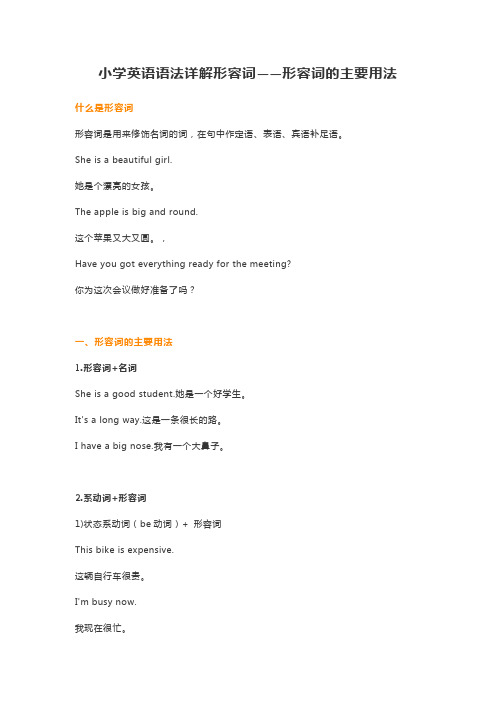
小学英语语法详解形容词——形容词的主要用法什么是形容词形容词是用来修饰名词的词,在句中作定语、表语、宾语补足语。
She is a beautiful girl.她是个漂亮的女孩。
The apple is big and round.这个苹果又大又圆。
,Have you got everything ready for the meeting?你为这次会议做好准备了吗?一、形容词的主要用法1.形容词+名词She is a good student.她是一个好学生。
It's a long way.这是一条很长的路。
I have a big nose.我有一个大鼻子。
2.系动词+形容词1)状态系动词(be动词)+ 形容词This bike is expensive.这辆自行车很贵。
I'm busy now.我现在很忙。
They are happy together.他们在一起很开心。
2)持续系动词+形容词He always keeps silent at meeting.他开会时总保持沉默。
The shop stays open till eight o'clock.商店开到八点。
3)表象系动词+形容词He looks tired.他看起来很累。
He seems(to be)very sad.他看起来很伤心。
4)感官系动词+形容词The scarf feels very soft.这条围巾手感很软。
This flower smells nice.这朵花闻起来很香。
5)变化系动词+形容词The leaves turn green.叶子变绿了。
The egg becomes bigger.蛋变大了。
学习小贴士:●在英语单词中something, anything, nothing等不定代词被形容词修饰时,形容词放在不定代词后面。
I have something important to tell you.我有重要的事要告诉你。
小学英语语法-形容词

小学英语语法-形容词1. 什么是形容词?形容词是一种词性,用来描述名词或代词的特征、性质或状态。
它可以使我们更详细地了解名词或代词的特点。
2. 形容词的用法形容词可以用来修饰名词或代词,通常放在名词或代词前面。
下面是一些例子:- a beautiful flower(一个漂亮的花)- an interesting book(一本有趣的书)- the tall tree(那棵高大的树)- my lovely cat(我可爱的猫)3. 形容词的比较级和最高级形容词有比较级和最高级两种形式,用来表达不同程度的比较。
比较级用于比较两个事物,最高级用于比较三个或更多事物。
- 比较级的构成:形容词原形 + er,例如:taller(更高的),bigger(更大的)- 最高级的构成:形容词原形 + est,例如:tallest(最高的),biggest(最大的)下面是一些使用比较级和最高级的例子:- This book is more interesting than that one.(这本书比那本书更有趣。
)- This is the tallest building in the city.(这是这座城市最高的建筑。
)4. 形容词的修饰范围形容词不仅可以修饰名词或代词,还可以修饰整个句子。
这时,形容词通常放在句子的最前面,用来表达说话人的感受或观点。
下面是一些使用形容词修饰句子的例子:- Amazingly, he finished the race in record time.(令人惊讶的是,他以创纪录的时间完成了比赛。
)- Unfortunately, the concert was canceled due to bad weather.(不幸的是,由于天气不好,音乐会被取消了。
)5. 形容词的数量和位置当形容词用于修饰复数名词时,通常位于名词的前面,并在形容词和名词之间加上 "s"。
英语语法总结形容词
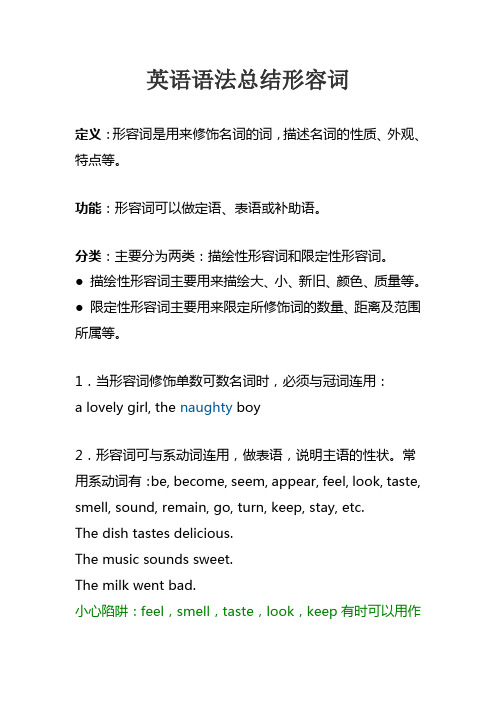
英语语法总结形容词定义:形容词是用来修饰名词的词,描述名词的性质、外观、特点等。
功能:形容词可以做定语、表语或补助语。
分类:主要分为两类:描绘性形容词和限定性形容词。
●描绘性形容词主要用来描绘大、小、新旧、颜色、质量等。
●限定性形容词主要用来限定所修饰词的数量、距离及范围所属等。
1.当形容词修饰单数可数名词时,必须与冠词连用:a lovely girl, the naughty boy2.形容词可与系动词连用,做表语,说明主语的性状。
常用系动词有:be, become, seem, appear, feel, look, taste, smell, sound, remain, go, turn, keep, stay, etc.The dish tastes delicious.The music sounds sweet.The milk went bad.小心陷阱:feel,smell,taste,look,keep有时可以用作实义动词,并可以用副词修饰。
He looked me up and down carefully.I tasted the soup slowly to see whether it was salty.3.形容词用作后置定语。
(简单理解:一般的形容词修饰名词时放在名词前面,但有些形容词修饰名词时放在名词的后面)a river navigable(一条可通航的河)sight visible (可见的景象)person responsible(负责人)注意:responsible person (有责任心的人)the best way possible(尽可能好的办法)the number necessary(必要的数量)the people present(在场的人)4.只能作表语的形容词(1) 某些表示健康状况的形容词。
well(身体好的),ill(病的),faint(虚弱的),poorly (身体不好的)示例:His mother has been ill for a long time.特别注意:sick是个特例。
英语语法-形容词

英语语法—形容词形容词[adjective] 很多语言中均有的主要词类中的一种。
主要用来修饰名词的词,表示事物的特征。
形容词的定义和用法:形容词用来修饰名词或代词, 表示人或事物的性质, 状态,和特征。
形容词在句中作定语, 表语, 宾语,补语。
She is a good student, and she works hard.她是一个好学生,她学习努力。
This bike is expensive.这辆自行车很贵。
I am sorry, I'm busy now.对不起,我现在很忙。
Have you got everything ready for the meeting?你为这次会议做好准备吗?形容词在句中的位置:形容词作定语一般放在被修饰的名词之前。
如果有两个或两个以上的形容词修饰一个名词时, 则由它们和被修饰的名词之间的密切程度而定, 越密切的形容词越靠近名词。
如果几个形容词的密切程度差不多则按音节少的形容词放在前面, 音节多的形容词放在后面。
英语单词中,something, anything, nothing 等不定代词被形容词修饰时,形容词放在名词后面。
I have something important to tell you.我有重要的事要告诉你。
Is there anything interesting in the film.电影里有什么有趣的内容吗?这儿一点都不危险。
由两个或两个以上的词组成的形容词词组修饰名词时须放在名词之后。
This is the book easy to read.这是一本容易读的书。
用and 或or 连接起来的两个形容词作定语时一般把它们放在被修饰的名词后面。
起进一步解释的作用。
Everybody, man and woman, old and young, should attend the meeting.每一个人,男女老少,都应该参加会议。
小学英语语法之-形容词
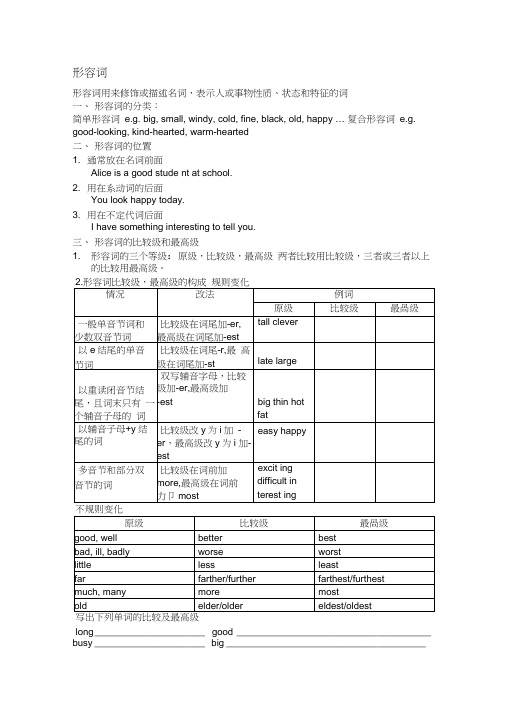
形容词形容词用来修饰或描述名词,表示人或事物性质、状态和特征的词一、形容词的分类:简单形容词 e.g. big, small, windy, cold, fine, black, old, happy … 复合形容词 e.g. good-looking, kind-hearted, warm-hearted二、形容词的位置1. 通常放在名词前面Alice is a good stude nt at school.2. 用在系动词的后面You look happy today.3. 用在不定代词后面I have something interesting to tell you.三、形容词的比较级和最高级1. 形容词的三个等级:原级,比较级,最高级两者比较用比较级,三者或三者以上的比较用最高级。
不规则变化写出下列单词的比较及最高级long _____________________ good _____________________________________ busy _____________________ big ______________________________________beautiful ____________________ late ___________________________________ 3. 形容词比较级的用法1) .常和than 连用,表示两者相比He is older than me / I .Skating is more exciting than swimming.2) .用于两者进行比较的选择疑问句。
Who is taller, Lily or Kate?Which subject is easier, English or Chinese?3) ................................................................. .比较级+and+比较级表示“越来越”The weather gets hotter and hotter.Beijing is becoming more and more beautiful.4. 形容词最高级用法 (形容词最高级前必须加the)1) . the +最高级+比较范围in/of…Lily is the best student in our class.He is the tallest of the three.2) .用于三者或三者以上进行比较的选择疑问句。
英语语法大攻克--形容词

形容词一、概念:形容词修饰名词,说明事物或人的性质或特征。
通常,可将形容词分成性质形容词和叙述形容词两类,其位置不一定都放在名词前面。
二、使用形容词的注意事项:1. 大部分形容词加-ly可构成副词。
但friendly,deadly,lovely,lonely,likely,lively,ugly,brotherly,仍为形容词。
2. 有些以-ly 结尾既为形容词,也为副词。
daily,weekly,monthly,yearly,early3. 某些形容词加上定冠词可以泛指一类人,与谓语动词的复数连接。
如:the dead,the living,the rich,the poor,the blind,the hungry4. 有关国家和民族的形容词加上定冠词指这个民族的整体,与动词的复数连用。
the British,the English,the French,the Chinese.5. 多个形容词修饰名词的顺序限定词--数词--描绘词--(大小,长短,形状,新旧,颜色) --出处--材料性质,类别--名词。
副词一、概念:副词主要用来修饰动词,形容词,副词或其他结构。
副词的种类有频度副词、方式副词、地点副词及时间副词等。
二、使用副词的注意事项:a) 副词的位置:在动词之前。
在be动词、助动词之后。
多个助动词时,副词一般放在第一个助动词后。
(大多数方式副词位于句尾,但宾语过长,副词可以提前,以使句子平衡。
方式副词well(好),badly (糟)、,hard(坏)等只放在句尾。
b) 副词的排列顺序:时间,地点副词,小单位的在前,大单位在后。
方式副词,短的在前,长的在后,并用and或but等连词连接。
多个不同副词排列:程度+地点+方式+时间副词。
c) 注意:副词very 可以修饰形容词,但不能修饰动词。
副词enough要放在形容词的后面,形容词enough放在名词前后都可。
d) 有些副词有两种形式,但是意义不同:close意思是"近"; closely 意思是"仔细地"late意思是"晚"; lately 意思是"最近"deep意思是"深",表示空间深度;deeply时常表示感情上的深度,"深深地"wide表示空间宽度;widely意思是"广泛地","在许多地方"high表示空间高度;highly表示程度,相当于muchfree的意思是"免费";freely 的意思是"无限制地"形容词与副词对比及比较级最高级一、形容词与副词比较级和最高级变化规则形容词和副词的比较级和最高级的构成方法完全相同。
小学英语语法——形容词与副词知识点讲解+练习

形容词和副词一、形容词、副词概述1、形容词定义:形容词(adjective),简称adj,用来修饰名词或代词,表示人或事物的性质、状态和特征。
2、副词定义:副词(adverb),简称adv,用来修饰动词、形容词或副词,表示时间、频率、范围、语气、程度等。
二、形容词、副词考点纵览三、综合练习( ) 1. How beautifully she sings! I have never heard _____ voice.A. a betterB. a bestC. the betterD. the best ( ) 2. She looks very _____ but I can’t remember her name.A. similarB. familiarC. friendlyD. strange ( ) 3. Children all looked _____ at the broken model plane and felt quite _____.A. sad; sadB. sadly; sadlyC. sad; sadlyD. sadly; sad( ) 4. The child dreamed that he had once lived in a _______ house in the forest.A. wooden pretty littleB. little pretty woodenC. pretty little woodenD. wooden little pretty( ) 5. ---Which team is _______ to win the game?---I don’t know, but I’ve found _______ for ours to win.A. probable; it unlikelyB. likely; it possibleC. possible; it possibleD. likely; it possibly( ) 6. With the development of the Internet, _______ communication is done by regular mail.A. lessB. moreC. littleD. few( ) 7. ---If you don’t like the red coat, take the blue one.---OK, but do you have ______ size in blue? This one’s a bit tight for me.A. a bigB. a biggerC. the bigD. the bigger( ) 8. If there were no examinations, we should have ______ at school.A. the happiest timeB. a more happier timeC. much happiest timeD. a much happier time( ) 9. This dress is prettier, but it costs ______ that one.A. twice more thanB. twice as much asC. as much twice asD. twice so much as( ) 10.________students are required to take part in the boat race.A. Ten strong young ChineseB. Ten Chinese strong youngC. Chinese ten young strongD. Young strong ten Chinese( ) 11. Allen had to call a taxi because the box was ____to carry all the way home.A. much too heavyB. too much heavyC. heavy too muchD. too heavy much( ) 12. Our neighbor has ________ours.A. as a big house asB. as big a house asC. the same big house asD. a house the same big as( ) 13. We were in ________when we left that we forgot the airline tickets.A. a rush so anxiousB. a such anxious rushC. so an anxious rushD. such an anxious rush( ) 14. ---I was riding along the street and all of a sudden, a car cut in and knocked me down.---You can never be ________careful in the street.A. muchB. veryC. soD. too( ) 15. ---You don’t look very ________.Are you ill?---No,I’m just a bit tired.A. goodB. wellC. strongD. healthy( ) 16. Four of Robert’s children were at the party,including ________, Luke.A. the eldestB. an oldest oneC. the oldD. an old one( ) 17. Many students signed up for the ________race in the sports meeting to be held next week.A. 800-metre-longB. 800-metres-longC. 800 metre lengthD. 800 metres length( ) 18. It’s always difficult being in a foreign country,________if you don’t speak the language.A. extremelyB. naturallyC. basicallyD. especially( ) 19. In recent years,travel companies have succeeded in selling us the idea that the further we go,__________.A. our holiday will be betterB. our holiday will be the betterC. the better our holiday will beD. the better will our holiday be( ) 20. When he heard a cry for help, he ran out as ________ as he could.A. hardlyB. quicklyC. finallyD. slowly( ) 21. “Our team is _____ to win the match.” “Really? But I don’t think so.”A. easyB. difficultC. possibleD. sure( ) 22. A ______ road goes ______ from one place to another.A. straight; straightB. straightly; straightlyC. straight; straightlyD. straightly; straight( ) 23. “This book is ______ more useful for us students.” “Yes, but it is _______ too difficult.”A. quite; quiteB. much; ratherC. rather; quite D quite; much( ) 24. There was a ______ change in the weather, and the rain came pouring down.A. quickB. slowC. fastD. sudden( ) 25. You can speak ______ in front of him, but you can’t eat ______ in his restaurant.A. freely; freelyB. free; freelyC. freely; freeD. free; free( ) 26. Tom will not be at the picnic, ______ to the family’s disappointment.A. muchB. moreC. too muchD. much more( ) 27. --- I have seen so little of Mike ______. Is he away on business?--- Oh, no. He just leaves for his office early and comes back very ______.A. later; latelyB. later; laterC. lately; lateD. late; lately( ) 28. From his ______ voice on the phone I know everything is well under way.A. satisfactoryB. satisfyingC. satisfiedD. satisfaction( ) 29. In ______ Chinese culture, marriage decisions were often made by parents for their children.A. traditionalB. historicC. peacefulD. civil( ) 30. The houses in the village are ______ built of wood and hay.A. mostB. almostC. nearlyD. mostly( ) 31. --- What do people wear when they go to the theatre?--- Well, it isn’t very ______. People can wear anything they like.A. normalB. certainC. modernD. simple( ) 32. Mary’s biology is ______ than ______ in the class.A. a lot of better; anyone else’sB. far better; anyone’s else’sC. much better; anyone elseD. a lot better; anyone else’s( ) 33. We decided not to climb the mountains because it was raining ____.A. badlyB. hardlyC. stronglyD. heavily( ) 34. Paris is one of _____ cities in the world.A. more beautifullyB. more beautifulC. the most beautifullyD. the most beautiful ( ) 35. Are you going to leave______?A. the open windowsB. the windows openingC. the windows openD. the windows opened( ) 36. Bob never does his homework _____ Mary, so he makes lots of mistakes.A. so careful asB. as carefully asC. carefully asD. as careful as.( ) 37. My sister is good at sports. She can jump ____ than me.A. highestB. very highC. too highD. much higher ( ) 38. When spring comes, the trees get ____.A. green and greenB. green and greenerC. greener and greenD. greener and greener( ) 39.He works very ___________.He _____________has a rest on Sundays.A. hard; hardlyB. hardly; hardC. hard; hardD. hardly; hardly( ) 40.He learns Russian_____________.A. goodB. niceC. wellD. fine( ) 41.The boy didn’t run______________ to catch the bus.A. fast enoughB. enough fastC. quick enoughD. enough quickly ( ) 42.Eating _____________ is bad for our health.A. much tooB. too muchC. too moreD. too many( ) 43.Have you ever seen ______________ big panda before?A. a suchB. such aC. so aD. as( ) 44.He looks very _____________ today.A. worriedB. worryC. worryingD. to worry( ) 45.Listen to me. I have _____________ to tell you.A. important somethingB. important anythingC. something importantD. anything important( ) 46. ---How ___ can you finish the drawing?--- In ten minutes.A. longB. often.C. soonD. rapid( ) 47. This book is _____ worth seeing again.A. veryB. quiteC. wellD. much( ) 48. My _____ brother is three years ____ than I .A. old; olderB. elder; olderC. older; elderD. old; elder( ) 49. We felt ___ after we watched the ___ football match.A. exciting; excitedB. excited; excitingC. excited; excitedD. exciting; exciting( ) 50. The old man lived ____ in the house, but he didn’t feel___.A. lonely; lonelyB. alone; lonelyC. alone; aloneD. lonely; alone小学英语语法——形容词与副词知识点讲解+练习参考答案1. A2.B3.D4.C5.B6.A7.B8.D9.B 10.A 11. A 12.B 13.D 14.D 15.B 16.A 17.A 18.D 19.C 20.B 21. D 22.A 23.B 24.D 25.C 26.A 27.C 28.C 29.A 30.D 31. B 32.D 33.D 34.D 35.C 36.B 37.D 38.D 39.A 40.C 41. A 42.B 43.B 44.A 45.C 46.C 47.C 48.B 49.B 50.B11。
小学英语语法--形容词
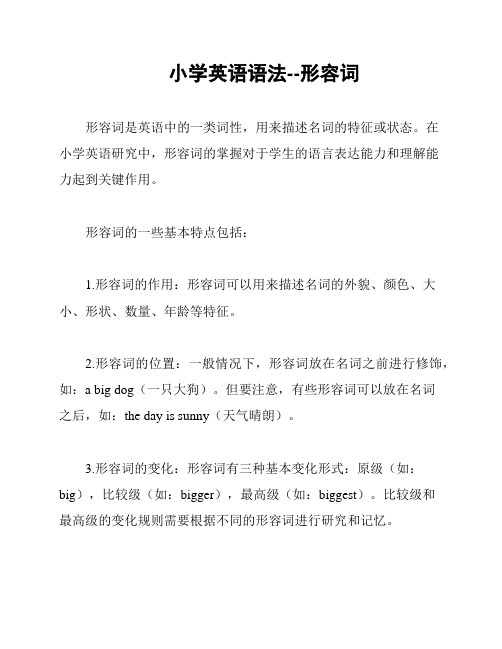
小学英语语法--形容词形容词是英语中的一类词性,用来描述名词的特征或状态。
在小学英语研究中,形容词的掌握对于学生的语言表达能力和理解能力起到关键作用。
形容词的一些基本特点包括:1.形容词的作用:形容词可以用来描述名词的外貌、颜色、大小、形状、数量、年龄等特征。
2.形容词的位置:一般情况下,形容词放在名词之前进行修饰,如:a big dog(一只大狗)。
但要注意,有些形容词可以放在名词之后,如:the day is sunny(天气晴朗)。
3.形容词的变化:形容词有三种基本变化形式:原级(如:big),比较级(如:bigger),最高级(如:biggest)。
比较级和最高级的变化规则需要根据不同的形容词进行研究和记忆。
4.形容词的修饰范围:形容词不仅可以修饰单个名词,还可以修饰整个句子或一段话。
例如:It is a beautiful day(今天天气很美)。
学生在研究形容词时,可以进行以下练和活动:1.词语排序:让学生根据形容词的大小、颜色、形状等特征进行排序,并进行正确的语法填空。
2.描述物品:让学生用适当的形容词来描述给定的物品,提高他们的描述能力和选择合适形容词的能力。
3.形容词对比:教师可给学生提供不同形容词的例句,让他们观察并比较形容词之间的差异。
4.创造句子:让学生以给定的形容词为起点,创造出有意义的句子,培养他们的语言表达能力和创造力。
通过以上活动和练,学生能够加深对形容词的理解,掌握形容词的用法,并在语言表达中更加准确和丰富。
(以上仅为简要介绍,具体内容可以根据实际情况进行拓展。
)参考资料:- ___.(2015)。
小学英语:阳光少儿英语(一年级~六年级)。
北京:人民出版社.以上是关于小学英语语法中的形容词的简要介绍,形容词对于学生的语言表达和理解能力非常重要。
可以通过一系列练习和活动来帮助学生掌握形容词的用法和变化规则,提高他们的语言表达能力。
具体的练习和活动可以根据实际情况进行拓展。
小学英语语法讲解-形容词
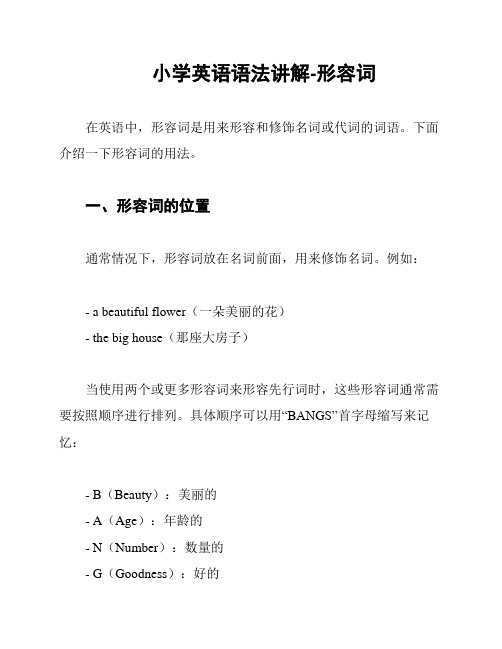
小学英语语法讲解-形容词在英语中,形容词是用来形容和修饰名词或代词的词语。
下面介绍一下形容词的用法。
一、形容词的位置通常情况下,形容词放在名词前面,用来修饰名词。
例如:- a beautiful flower(一朵美丽的花)- the big house(那座大房子)当使用两个或更多形容词来形容先行词时,这些形容词通常需要按照顺序进行排列。
具体顺序可以用“BANGS”首字母缩写来记忆:- B(Beauty):美丽的- A(Age):年龄的- N(Number):数量的- G(Goodness):好的- S(Size):大小的例如,正确的顺序为:a beautiful old Chinese bowl(一只美丽的、古老的、中国式的碗)二、形容词的比较级和最高级形容词有比较级和最高级两种形式。
用来表示两个事物之间的比较,可以使用比较级,常用的比较级形式有“-er”和“more + 形容词”。
如:- My sister is taller than I am.(我姐姐比我高。
)- The water is more blue than green.(水的颜色更蓝。
)用来表示三个或三个以上事物之间的比较,可以使用最高级,常用的最高级形式有“-est”和“most + 形容词”。
如:- She is the tallest student in the class.(她是班上最高的学生。
)- The black cat is the most popular one in the pet store.(黑猫是宠物店里最受欢迎的。
)三、形容词的否定形式在英语中,当需要否定形容词时,可以在形容词前面加上“not”。
如:- Jim is not tall.(吉姆不高。
)四、形容词的所有格形式当形容词用于表示某人或某物的所有格时,通常需要加上一个“-’s”。
如:- The girl’s hair is beautiful.(女孩儿的头发很漂亮。
小学英语语法:形容词
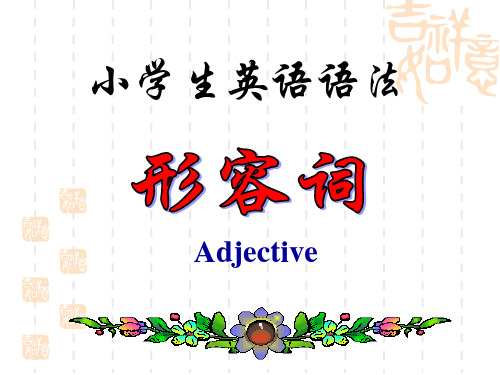
This suit is blue.
These suits are blue.
The apple is red.
The apples are red.
形容词的类别
课本p20
原级
形词 比较级 最高级
二.形容词比较等级的构成
1. 规则变化
原级 比较级
Longer taller nicer larger busier easier bigger hotter thinner
练习题
P25 一
(2)nice (6) old
属于不规则变化
口诀
三.形容词比较等级的用法
as + 形容词原形 + as(和„„一样)
Tom is as tall as Mike. Tom 和Mike 一样高。
P26 四 1、2
否定:not as + 原形 + as (和„ 不一样) 或:not so + 原形 + as(不及/不如„ )
最高级
Longest tallest nicest largest busiest easiest biggest hottest thinnest
单 音 节 和 部 分 双 音 节
多音 节词
一般情况 词尾加er或est 词尾若是哑音e, 直接加r或st 辅音字母若加y, y变i加er/est 一辅重读闭音节, 辅音字母要双写
小学生英语语法
Adjective
一.形容词的概念 1. 形容词是用来修饰和描述名词,通 常放在名词之前
a blue cap
a big orange
形容词既可修饰单数也可修饰复数
a red strawberry
- 1、下载文档前请自行甄别文档内容的完整性,平台不提供额外的编辑、内容补充、找答案等附加服务。
- 2、"仅部分预览"的文档,不可在线预览部分如存在完整性等问题,可反馈申请退款(可完整预览的文档不适用该条件!)。
- 3、如文档侵犯您的权益,请联系客服反馈,我们会尽快为您处理(人工客服工作时间:9:00-18:30)。
英语语法——形容词与副词来源:普特英语形容词1.1 什么是形容词形容词(adjective)是修饰名词表示名词属性的词,常放在它所修饰的名词之前。
如:a lovely baby一个可爱的婴儿the beautiful picture那幅美丽的图画modern history现代历史1.2 形容词的用法形容词在句中可用作:1)定语He is a good boy.他是个好孩子。
The Chinese Communist Party is a great party.中国共产党是伟大的党。
2)表语The film is both moving and instructive.这部电影很感动人,而且富有教育意义。
I am very glad to see you.见到你很高兴。
3)宾语补足语和宾语一起构成复合宾语。
如:Have you got everything ready for the journey? 你行装都准备好了吗?We keep our rooms clean and tidy.我们经常保持房间的整洁。
4)相当于名词某些形容词前用定冠词the,变成名词化的形容词,可在句中作主语、宾语等。
如:The young are active.青年人积极好动。
(the young作主语)The blind can learn to read with their fingertips. 盲人能够用指尖学习阅读书籍。
(the blind作主语)He has a keen sense of the new.他对新鲜事物有敏锐的感觉。
(the new作宾语)[注一]上述三例中的the young = the young people,the blind the Blind people,the new the new things.[注二]在The sun rose red(旭日升起)中的形容词red和Don't marry young(不要早婚)中的形容词young都是主语补足语。
1.3 形容词的位置形容词常放在它所修饰的名词之前。
关于形容词有时可以后置的问题(见16.18),但如有一个以上的形容词修饰名词,这些形容词的顺序则由它们和被修饰名词的关系的密切程度来决定。
一般说来,关系最密切的最*近被修饰的名词,关系较疏远的离被修饰的名词也较远。
如:a large wild plant一株很大的野生植物a simple musical instrument一种简单的乐器a small fierce dark brown animal一种小而凶的深褐色动物(注意dark修饰brown)以上例子中的形容词之间并非并列关系,如第一例中的1arge与wild并非并列,而1arge所修饰的是wild plant。
如表并列关系,形容词之间须用逗号或and。
如:a strong, swift horse一匹又壮又快的马many happy and healthy children很多幸福而健康的儿童a short and militant article一篇简短有力的文章(militant一词较长,放在short之后,这也是英语里安排形容词位置的一种方法。
)形容词的比较等级及其形式英语形容词比较等级(degrees of comparison)一般有两个:即比较级(comparative degree)和最高级(superlative degree)。
不用比较等级的形容词通常称为原级(positive degree)。
形容词的比较级形式是:"形容词+后缀 -er "或"单词 more + 形容词"。
它的最高级形式是:"形容词 + 后缀-est "或"单词 most + 形容词。
[注一] 形容词比较等级所加的-er和-est,自成一个音节,分别读作[E]和[ist]o 如:原级比较级最高级tall [tC:l] taller[5tC:lE] tallest[5tC:list]happy [5hApi] happier[5hApiE] happiest[5hApiist]thin [Win] thinner [5WinE] thinnest [5Winist]fine [fain] finer [5fainE] finest [5fainist][注二]如果形容词原级的词末为不发音的字母r,加-er和-est时,r要发[r]音。
如:near [niE] nearer [5niErE] nearest[5niErist]clear [kliE] clearer[5kliErE] clearest [5kiErist]如果形容词原级词末的发音为[N],在加-er和-est时,[N]音后得加一个[g]音。
如:strong [strCN] stronger [5strCNgE] strongest [5strCNgist]long [lCN] longer [5lCNgE] longest [5lCNgist][注三]有些形容词一般没有比较等级。
如:right, wrong,woolen,wooden.不规则变化原级比较级最高级good好we11好,健康的 better bestbad 坏,差 worse worstmany 多 more mostmuch 多little 小,少 1ess 1eastfar 远 farther,further farthest,furthest形容词前如加1ess和least,则表示"较不"和"最不"。
如:interesting有趣 difficult 难less interesting 较无趣 less difficult 较不难least interesting 最无趣 leas difficult最不难1.4 形容词比较级的用法比较级用于二者的比较,其结构是:含有形容词比较级的主句+从属连词 than 引导的从句(从句中常省去意义上和主句相同的部分)。
如:Li is older than Zhou. 李比周年纪大。
(从句中省去了is old)There are more children in this nursey than in that one.这个托儿所的孩子比那个托儿所多。
(从句中省去了 there are children)After two years' physical training,she is healthier and stronger.经过两年的体力锻炼,她(比以前)健康强壮多了。
(注意这里省去了从句than she was)We are much better off than ever before.我们的生活比过去任何时候都要好得多。
(than后省去了we were)Paul weighs less than harry.保尔的体重比哈利轻。
Mary is less clever than Jane.玛丽不如简那么聪明。
[注一]汉语可以说"昆明的气候比兰州好"。
英语必须加that,译为:The climate of Kunming is better than that of Lanzhou.[注二]英语比较级常译作"较…"、"…一些"等,但不等于汉语的"更…"。
汉语的"更…"须用"still"或"even"来表示如:This book is even more difficult than that one.这本书比那本书更难。
[注三]有些情况下,汉语不用"较"等字眼,英语则须用比较级,如:Will the younger people give their seats to old people?请年轻人把座位让给老年人好不好?1.5 形容词最高级的用法形容词最高级用于二者以上的比较,其结构一般是:定冠词the+形容词最高级+名词+表示范围的短语或从句。
如:Peter is the oldest boy of them all.彼得是这群男孩中年纪最大的。
(介语短语of them all表示范围)London is the biggest city in Britain,伦敦是英国最大的城市。
(介词短语in Britain表示范围)Mt. Qomolangma is the World's highest peak。
珠穆朗玛峰是世界最高峰。
(注意这里表示范围的是名词所有格 the world's)This is the best film (that) I have ever seen.这是我所看过的最好的电影。
(that在口语中一般省略,that从句表示范围)[注一]形容词最高级后的名词如果在前面已提过,可省去。
如:This novel is the best (that) I have ever read.这是我所看过的小说中最好的一本。
[注二]在口语中,形容词最高级也可以用于二者的比较。
如:This is the shortest of the two roads.这是两条路中最近的一条路。
[注三] 形容词最高级用作表语表品质时,其前不用定冠词the。
如:He is happiest when he is working.他工作时最愉快。
副词2.1什么是副词副词(adverb)修饰动词、形容词和其他副词等,说明时间、地点、程度、方式等概念。
如:often往往,here这里,very很,quickly很快地。
2.2副词的构成1)本身就是副词,如now现在,there那里,rather颇。
2)由形容词加词尾-1y变来,如firmly坚决地,happi1y幸福地。
3)与形容词同形early adj. 早的 early adv. 早high adj. 高的 high adv. 高高地long adj. 长的,长久的long adv. 长久地2.3副词的种类副词可分为下列几种:1)普通副词(ordinary adverb)如:together一起,well好,seriously认真地,slowly慢,carefully小心地。
2)疑问副词(interrogative adverb)如:when何时,where何地,how如何,why为何。
3)关系副词(relative adverb)如:where,when。
